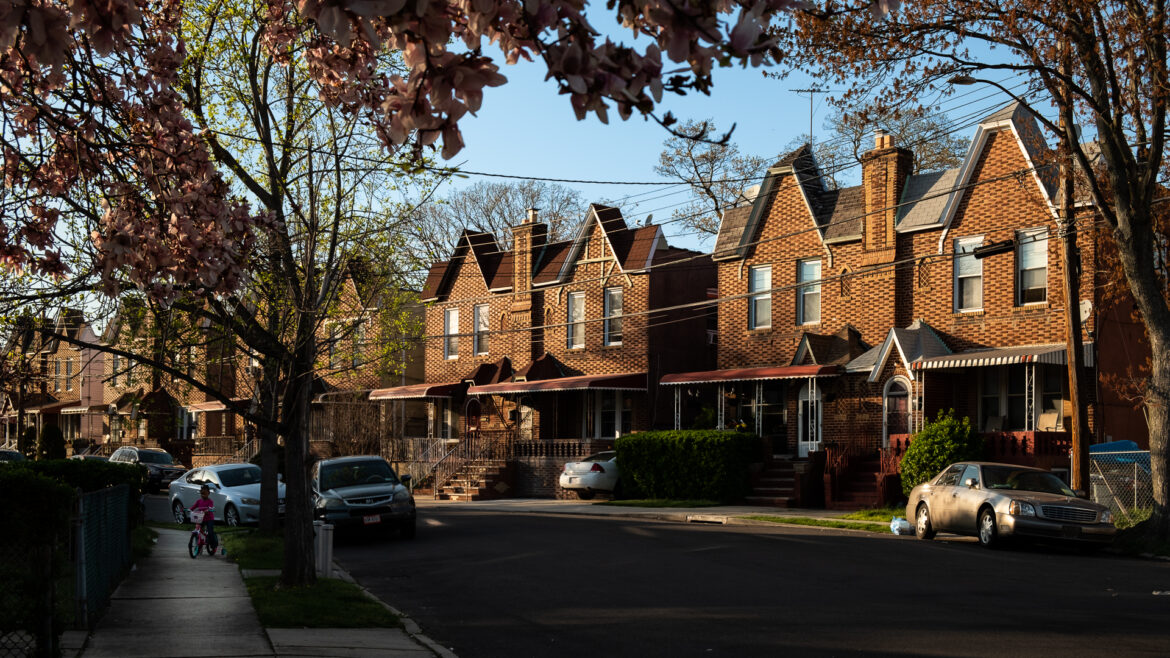“Both city and state governments must extend their efforts beyond the final budget deal, recognizing that tenants’ well-being is intertwined with the physical and financial stability of their homes and addressing root causes rather than assigning blame.”

Adi Talwar
Homes in Queens’ Addisleigh Park neighborhood.State lawmakers are nearing a historic deal to boost affordable housing production and to enact tenant protections against unfair rent hikes and eviction without “good cause.” While the exact details of the deal remain unclear, it’s evident that both sides are making concessions.
However, to ensure community stability, both city and state governments must extend their efforts beyond the final budget deal, recognizing that tenants’ well-being is intertwined with the physical and financial stability of their homes and addressing root causes rather than assigning blame.
Even before State budget negotiations heated up, landlords were making the case for rent hikes in New York City’s rent-regulated units. In March, the Rent Guidelines Board (RGB), which sets increases for rent-stabilized apartments, issued an annual report showing landlord operating costs were rising while revenue was declining. As tenant organizers, we worried the report had all but sealed tenants’ fates: there would be another year of rent increases to cover these growing costs.
Working at an organization that both organizes tenants and manages affordable housing, I’ve witnessed the rising costs of labor, utilities, and insurance. However, relying on tenants—whose wages haven’t kept pace with inflation and who are already rent burdened—to foot the bill absolves government of its fundamental responsibilities to address the need to broaden rental assistance, improve wages, and address factors impacting higher costs.
Take, for example, the escalating costs of insurance. A recent New York Housing Conference analysis found systemic issues within the affordable housing insurance industry, including widespread discrimination against affordable housing operators, as well as the twin challenges of increasing costs and decreasing coverage.
Instead of accepting these disparities as inevitable, the state must intervene to investigate and address the factors driving these cost hikes. Additionally, the governor must make good on her promise to ban discrimination by insurance companies based on income source and income level of residents.
As the state nears a significant deal to preserve and create new affordable housing, landlords are pushing for changes that could impose additional costs on tenants. One concession being discussed in Albany is raising the $15,000 cap for individual apartment improvements (IAIs), established in landmark legislation passed in 2019.
The cap was a major victory against the construction harassment and excessive rent hikes that IAIs historically created, but it has also led to a disincentive for landlords to make necessary improvements, or worse, led some to “warehouse” vacant rent-stabilized apartments rather than make investments they weren’t confident they could recoup.
However, it’s unclear what the most effective intervention is. In 2023, the NYC Department of Housing Preservation & Development (HPD) launched Unlocking Doors, a capital investment pilot that offered landlords with distressed, vacant rent-stabilized units up to $25,000 for repairs. However, at a City Council hearing in March, HPD reported that only one landlord had applied to the pilot.
Some advocates argue the program’s uptake has been low as landlords continue to warehouse units to bolster their case for rolling back the 2019 rent reforms. However, if the city is serious about addressing these capital needs, it should be increasing the support it offers through Unlocking Doors, as Councilmember Pierina Sanchez suggested during the March hearing.
Another concession on the negotiating table in Albany is a modified version of the “good cause” eviction legislation that tenant advocates have been fighting for since 2019. Some leaked reports indicate that the governor is seeking exemptions based on the size of a landlord’s portfolio, which poses a challenge for tenants who have no way of knowing the extent of their landlord’s holdings, in part because landlords use different limited liability companies (LLCs).
Last session, Albany legislators passed the LLC Transparency Act, designed to help tenants, and organizers like us, identify the “beneficial owners” of any LLC through a public database. However, in December, the governor signed the act into law with an amendment restricting access to the database to law enforcement, government agencies, or through a court order.
While tenants shouldn’t bear the responsibility of determining whether their landlord is exempt from providing good cause protections, restoring the original version of the LLC Transparency Act will be essential if the governor is serious about enacting the proposed exemptions to good cause.
As legislators work to finalize a deal, it’s imperative to remember that addressing the housing crisis extends beyond Albany’s chambers. It requires collective action across all levels and branches of government to ensure tenants and our communities are not left bearing the burdens of decades of deferred leadership on housing.
Now is the time for a coordinated, comprehensive approach to build and preserve affordable housing at scale and to keep tenants living in their homes and with dignity.
Sarah Batchu is the director of programs at Fifth Avenue Committee, a 46-year-old comprehensive community development corporation whose mission is to advance economic, social, and racial justice in New York City.









One thought on “Opinion: Fixing NY’s Housing Crisis Doesn’t End With Albany Budget Deal”
Absolutely agree. While an Albany budget deal may address some aspects of New York’s housing crisis, it’s clear that a comprehensive solution requires multifaceted approaches. Addressing housing affordability, homelessness, and equitable access to housing involves collaboration between state and local governments, private developers, non-profit organizations, and community stakeholders. Solutions should prioritize affordable housing development, tenant protections, zoning reforms, and investment in supportive services for those in need. It’s a complex issue that demands holistic strategies beyond just budget allocations.